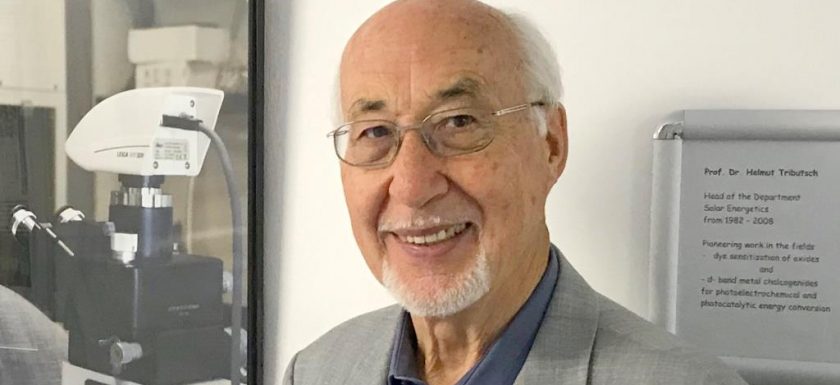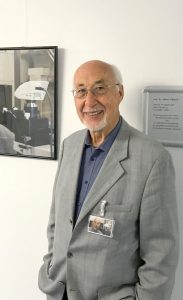
Many at HZB will still remember him. Between 1982 and 2008, Professor Helmut Tributsch played a key role in establishing solar energy research at the former Hahn-Meitner Institute. He authored over 450 publications in renowned journals and several books. Since retiring, he has been living on a farm in Italy, immersing himself in the questions that have preoccupied him since his student days. Antonia Rötger spoke with the physicist.
Professor Tributsch, in your new popular science book, you criticise how modern physics deals with the concept of time. Why?
Physics has made a fundamental mistake: it has ignored the irreversible, energy-driven time that we experience, instead creating an artificial, passive concept of time that can be manipulated by theories and used as a measure of everything. In most physics equations, time can run forwards or backwards. This is the fundamental problem. All natural processes have a direction of time; nature is not reversible. But our equations are.
How did you come to this conclusion?
As a physicist, I find it logical to accept that there is a direction of time because entropy only develops into the future. Even as a student, I was unsettled by the paradoxes arising in quantum physics and relativity theory. In quantum physics, time is treated in such a way that the uncertainty principle emerges, expressed as the product of energy and time. While this is useful in some respects, it also leads to problems: one uses a time that is incorrect and an energy that has no direction. Physicists have become accustomed to these concepts, but I believe we should continue to investigate their meaning.
Which processes can be better described with ‘natural time’?
I advocate a concept of natural time that includes entropy — an effective time, if you will. This is something we can work with. For instance, I collaborated with experts to study the phenomenon of water transport in extremely tall trees. Conventional equations cannot really explain this; it should not be possible to transport water so high against gravity, yet there are trees in nature that are over 100 metres tall and can still supply themselves with water. We have modelled how this can work. The fact is that nothing happens for the first two hours after sunrise. The tree first has to prepare itself, and then it suddenly starts. This model is based on feedback, and I was able to demonstrate that this feedback precisely leads to the van der Waals equation, which until now had only been derived empirically.
How and why can an effective time better capture such processes?
This is about feedback, which plays an important role in nature. Feedback processes are also crucial in catalysis research. I have published papers on this topic in journals such as Science. In nature, feedback occurs when a particle moves from the donor to the acceptor, influencing the environment. According to the quantum mechanical description, the particle can be in both locations simultaneously. Feedback can be used to block the return path. I am convinced that adopting a more realistic concept of time in natural science could lead to rapid progress, particularly in areas where we are currently rather helpless.
Where do you see the next big challenges for research?
I think it’s incredibly important to direct scientific research towards solving humanity’s problems. Currently, a great deal of money is being invested in projects that don’t achieve much, such as string theory. What we need is a new generation of natural scientists with a philosophical education who can advise politicians on how to deal with environmental issues more effectively.
Solar technology has already achieved this. Were you able to contribute to it?

Yes, it’s an incredible success. We would be much worse off if that hadn’t been achieved. While I was at the Hahn-Meitner Institute, I wrote a book called ‘Return to the Sun’. At an event held at the Freie Universität Berlin, Hermann Scheer, a member of the Bundestag, approached me and said that the ideas in the book sounded very reasonable, but why was nothing being done about them? I replied that we lacked politicians who could help implement these ideas. That’s how it started. I was a founding member of Eurosolar and served on the board for ten years. Hermann Scheer was instrumental in pushing the energy issue forward. Contact between science and politics is important. It worked with Hermann Scheer back then.
You would like to engage in a professional discussion about the concept of time in physics. But quantum physics works. So why should we concern ourselves with time?
The problem lies in specialisation. There are few people who deal with such problems in a comprehensive manner. Very, very few people address the fundamental questions I have encountered. It’s true that physics has proven to be effective. Apart from the paradoxes, that is. We have become accustomed to these paradoxes, but is that really the solution? Efforts are now being made to develop physics more quickly with the help of Artificial Intelligence (AI). However, since AI is based on existing knowledge, including the known paradoxes, future theories will contain even more paradoxes. Humans will no longer understand these theories. This is not an effective way to describe nature. With a correct concept of time and energy, nature remains logically understandable — this is my point.
Thank you for the conversation!
More information about the ideas of Helmut Tributsch>
